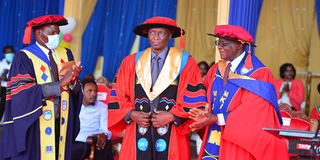Mount Kenya University installs new vice-chancellor
Sponsored by Mount Kenya University

MKU Pro-Chancellor Dr Vincent Gaitho (left) and Council Chairman Prof David Serem (right), welcome Prof Prof Deogratius Jaganyi, the new Vice-Chancellor.
By Evans Ongwae
Mount Kenya University’s second Vice-Chancellor, Prof Deogratius Jaganyi, believes he has joined an institution with the potential to make a massive difference in society. He was officially installed on January 29, 2021, succeeding Prof Stanley Waudo, who has been MKU VC since 2008.
Prof Jaganyi says he is focused on positioning MKU as a global university in learning and teaching, as well as research and innovation. He says the university is on course to establishing the MKU Cancer, Teaching, Research and Referral Hospital (CTRRH). This will deliver knowledge, innovation and technological advancements in the fight against cancer.
He says the university can achieve this goal by sustaining excellence that is measured by international standards.
While addressing those present during his installation, the new VC declared: “Short-term events (such as Covid-19 and others) must not distract us from this goal.”
Added Prof Jaganyi: “I want us to stand back, and think about the longer term. What kind of university should we be by year 2029 as per our Strategic Plan? How do we position ourselves to flourish in the middle of the changing conditions and challenges around us?” he posed.
The VC identifies preparing students for the 21st Century’s workplace as a challenge the university must face head-on so to impart the relevant skills.
Prof Jaganyi notes that the types of jobs being created are in the emerging fields, largely driven by Information Communication and Technology (ICT).
“Companies,” says the MKU VC, “already want ‘ABCD’: A for Artificial Intelligence, B for Blockchain, C for Cloud Computing, and D for Data Analytics.”
Prof Jaganyi asserts that these are emerging skills that companies need to remain globally competitive, and they look to universities to provide the required human resource.
He also notes that the world is in the midst of the Fourth Industrial Revolution, “where we are witnessing the extraordinary coming together of the digital, physical and biological realms.”
According to the VC, the concern is, “How do we prepare our graduates to be very adaptable?”
Another issue that he says need serious focus is Competency-based Curriculum (CBC). He says MKU will review and align its undergraduate programmes to this system, in readiness to receive Competency-Based Education (CBE) learners who will transition to university.
Prof Jaganyi notes that the Covid-19 pandemic has had a significant impact on higher education institutions around the world, including Kenya. The physical closure of campuses meant the rapid adoption of digital technology to ensure the continued delivery of education. The unplanned move to online platforms and pedagogies meant a leapfrog into a future of digital learning that most of the higher education institutions were not truly prepared for.
For MKU, says the VC, this represents transformative possibilities in the form of new paradigms of learning.
MKU was able to seamlessly move to online teaching based on its experience and major investments in the Open, Distance and Electronic Learning (ODEL) platform. The increase of online learning as a mitigating measure presented an opportunity for MKU to enhance its ICT platform to accommodate increased demand for accessibility to the programmes.
Kenyans in Diaspora continue seeking higher education and they have found a home with their own university through ODEL.
MKU has students in Canada, Denmark, Germany, South Korea, Kuwait, Iraq, Qatar, United Arab Emirates (UAE) and in several African countries, studying online.
Prof Jaganyi says with the successful online examination in 2019, the MKU recruitment office will now recruit students from across the world, even where Kenya Embassies and Missions have no representation.
“The students can comfortably do their exams from the comfort of their home,” says Prof Jaganyi.
The enrolment of MKU in the last 11 years increased from 3,000 in 2008 to 40,000 students in 2020 in five campuses, seven Open, Distance and Electronic Learning Centres (ODEL) across the country, a campus in Kigali, Rwanda and with a presence in Uganda, and Somaliland.
This semester, the university has attracted 124 foreign students from Malawi, Gambia, Ghana, Chad, Liberia and Senegal. In total, MKU currently has students from 34 countries.
The VC says excellence in research will have to be a defining feature of our institutional landscape. It is an integral part of fulfilling the university's mission and therefore plays a key role in establishing international reputation, which in turn attracts competitive research resources and collaborators to ensure long-term sustainability.
Prof Jaganyi asserts that MKU will continue to foster and give space for fundamental research as the foundation of innovation, but, “as our mission charges us, we must also look outwards to improve lives and opportunities in society.”
He explains that MKU will embed the agenda of transformative research and innovation at the core of the institution’s mandate and mainstream the research function in the undergraduate and graduate programmes. It will also establish centres of excellence as hubs of knowledge generation, including the development of Science and Technology Park as well as Business Park.
On its community outreach mandate, Prof Jaganyi says the university will continue to contribute to the social and economic success of local and national communities through the use of its expertise and knowledge to address the challenges facing communities.
“Social responsibility will be part of our research and learning activities,” says the MKU VC, adding that this will include sustainability, ethics and integrity, finding solutions to the challenges, public engagement and community support.
Prof Jaganyi details his vision for MKU here.
Meanwhile, January, April and May intakes are ongoing. See video below:


